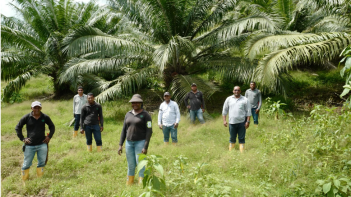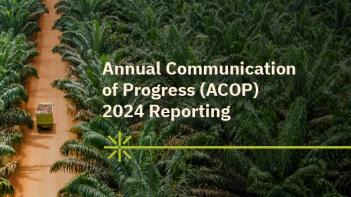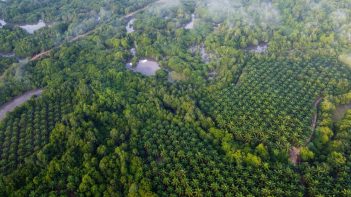As sustainable palm oil continues its dynamic growth in Latin America, new challenges and opportunities emerge, such as ensuring that smallholder farmers are able to reap the multiple socioeconomic benefits stemming from the sector’s robust expansion.
To explore these potential opportunities, RSPO spoke with sustainability specialist Flavio Linares, who, for over three decades, has worked in multiple development projects in Central America towards improving farmers’ livelihoods in oil palm, coffee, cocoa, and sugarcane. His previous tenure as Technical Head of Programmes for the Solidaridad Network led him to work closely with RSPO in promoting the RSPO Standard in the Latin American palm oil value chain. Linares makes the business case for smallholder certification, urging us to view small farmers as potential micro-entrepreneurs.
While it is encouraging to note Latin America’s emergence as a sustainability leader, it also means that strengthening the inclusion of smallholders in the palm oil value chain has become more urgent than ever. What are some of the main challenges faced by palm oil smallholders in Latin America, and what solutions would you like to see implemented to address these?
One of the major challenges is to increase productivity per hectare by at least 20-22 MT of fresh fruit bunch per hectare. In the palm oil value chain, this is one of the main priorities that need to be worked on in order to increase yields by using Best Management Practices in farms managed by smallholders. Smallholders also face difficulties in securing land titles for smallholder properties.
Another challenge is traceability – the European Deforestation Regulation is focusing on traceability, and this requires more investments for smallholders. But this is very much aligned with land titles – it is impossible to show traceability if there are questions with land titles. So that means governments and the palm oil sector, including mills, should work together to review their strategy.
There are also environmental challenges related to the infrastructure for palm oil mill effluent (POME) management in the mills, getting a fair price for FFB based on real extraction rate reports in the mills, and improving workers’ social conditions. Smallholders also face high RSPO Certification costs.
Having worked with smallholders across various commodities, including coffee, cocoa, sugar, and palm oil, how do they respond to some of the biggest global sustainability challenges, such as climate change and deforestation?
Producers are actually the best meteorologists and have observed the impacts of high climatic variability on their crops. Smallholders require greater attention from market players, government and international organisations to support them with climate change adaptation and mitigation programmes, which need technical assistance for them to learn and adopt climate smart practices, promote incentive mechanisms for their adoption or performance as well as agricultural insurance and fair carbon credits.
Private companies need to improve productivity, which means we need to find ways to adapt better to climate change. For example, we designed a tool measuring adaptation index for climate change in palm oil. We need to implement more regenerative agricultural practices. In Mexico, we made a study among smallholders to try to create a model for regenerative palm oil production systems. So we know that it is possible to create more diversification with palm oil in the crops at the field level. The business case for regenerative palm oil using regenerative agricultural practices is strong.
What are the biggest incentives for small farmers to engage in sustainable agriculture?
Incentives vary by crop, country and markets among other things. They need tax incentives for example, including exemption in the acquisition of equipment and supplies, as well as incentives for the diversification of farms in agroforestry systems and carbon sequestration. Other incentives include co-financing for the acquisition of seeds, fertilisers, bio-inputs, and better prices stemming from the increase in fruit quality production and improvement in productivity per hectare.
Latin America has also been seeing growth in smallholder certification, how would you encourage this growth to get more smallholders to get on the sustainability journey?
My philosophy is that certification needs to be a business case for smallholders. This is part of the “Prosperity” pillar. Smallholder associations working with mills can focus more on these aspects, supporting them in the development of strategies to increase profitability and productivity, as well as the quality of the oil.
We need to identify financial mechanisms for RSPO Certification for smallholders. Smallholders are very traditional, they don’t look at production costs, which means they need training on financial education and administration. We need to look beyond them as just smallholders, and instead think of them as microentrepreneurs.
Having worked on promoting the RSPO Standards across Latin America, what should stakeholders in the Americas do to further align with RSPO Standards?
There is definitely an opportunity for stakeholders in the region to become more strategic in promoting a more productive, socially and climatically resilient landscape for palm oil growers and industrialists. Putting smallholders at the heart of national economic strategies in grower nations is a viable pathway towards improving the livelihoods of producer families and workers with better conditions paying decent wages, so that it prevents them from migrating to the United States and Canada.
Looking ahead, what positive developments would you like to see in the region over the next decade?
I hope to see the transformation of the palm oil sector by becoming more inclusive and innovative – applying regenerative agriculture practices and digital solutions for example – and placing small producers and workers as the centre of change since they are still the weakest part of the value chain. I’d like to see traders and corporate markets become more committed to a sustainability framework, supporting traceability and innovation with incentives beyond the certification of international standards to improve farmers’ livelihoods and workers’ conditions.
Keep reading

RSPO Forum for Members and Certification Bodies 2025: Strengthening Capacities and Building Bridges with RSPO Members

From Violence to Prosperity: Cultivating Sustainable Palm Oil in San Pablo, Colombia

Palmas de Tumaco: Wisdom from the Land in Colombia’s Pacific Coast
Carry Over Credits for Certified Independent Smallholder Groups

Latin American Smallholders and Global Brands Unite in Peruvian Amazon to Advance Sustainable Palm Oil

From the Amazon to the Aisles: Discovering Sustainable Palm Oil in the Heart of Peru

Global Trends of Sustainable Palm Oil and China's Pathway

Final list of ACOP 2024 Non Submitters




